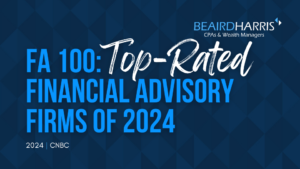
Presidential Elections: What Do They Mean for Markets?
It’s natural for investors to look for a connection between who wins the White House and which way stocks will go.


No matter how familiar we are with investing, we’ve all navigated uncertainty, weighed risks and rewards, and made carefully considered tradeoff decisions. Just by being human, we’ve been compelled to tackle the central challenges of life—which also happen to be the central challenges of investing.
At Beaird Harris, we believe that having a good investment experience is about more than returns. What matters just as much is how someone feels along their financial journey. And that’s really what the investment business should be about: helping people live better, more meaningful lives.
Investing better means living better. Not just because it can lead to having more money, but because many of the habits that serve us well as investors serve us well in life, too. By integrating our life and investment philosophies, we can see money as a tool that empowers our plans rather than as a goal in and of itself. Here are six principles that can help you in life and in investing.
Uncertainty can be uncomfortable, but we often forget that, without it, there would be no opportunity. When we decide to move to a new city or change career paths, we don’t know exactly what will happen. There’s always a risk that things won’t work out the way we had hoped, yet these experiences help us grow and can change our lives in amazing ways.
When you invest, returns are compensation for taking on uncertainty. Without risk, there would be no reward. But there’s also risk in choosing not to invest, because if your money doesn’t grow over time, it won’t go as far in the future. Cash hidden under a mattress can’t keep up with inflation.
As investors, it’s easy to get caught up in worrying when markets drop. But when we realize that investing means getting paid for accepting risk, we can start to see uncertainty as a source of opportunity, even during times of market volatility.
Embracing uncertainty rather than trying to avoid it can help us live better. This approach to life and investing guides us through uncertain times and helps refocus our attention on the opportunities ahead.
We’ve all tried to predict what will happen in life, only to be disappointed when it didn’t turn out the way we anticipated. But human beings develop strategies to deal with the fact that none of us has a crystal ball. We apply to a list of potential colleges, not just our first choice. We interview a series of job candidates, even when there’s a clear front-runner. We wear a life jacket on a boat, even though we know how to swim.
Investing is just like life: For maximum peace of mind, we make plans that account for a broad range of possible outcomes. This way, you can feel empowered by the unknown instead of paralyzed by it.
Research has shown that stock pickers consistently underperform their benchmarks.1 But you don’t need to be able to predict winners to have a good investment experience. Over the past century, markets have returned, on average, about 10% a year.2
So don’t try to outguess markets—go with them, even when that means tolerating and being prepared to live through some short-term disappointments. Odds are you’ll have a better investment experience in the long run.
When you’re in the market for a new car, you probably know exactly what you want, down to the color of the interior trim. But it can be hard to locate the precise model and features you’re after, and once you do find the car you want, you may have to pay a premium for it.
If you’re willing to be flexible with your choices—maybe going with black instead of gray or sacrificing a sunroof—you can get that new car faster, and at a better price. Life rewards flexibility over rigidity.
Flexibility adds value in investing, too. Staying flexible around what stocks to hold and when to trade can give you an advantage. In the case of index funds, while a solid, low-cost solution for many investors, they are forced to trade on certain days to track their index. The funds may not get the best prices on the securities they hold, resulting in investors leaving returns on the table.
Index fund investors may end up buying index additions at high prices and selling index deletions at low prices. These results highlight the importance of flexibility and efficiency in portfolio design, portfolio management, and trading. A systematic investment process that rebalances thoughtfully and flexibly can help investors avoid the costs associated with demanding immediacy, while still providing many of the benefits of index investing.
In life, as in investing, sound decisions are often grounded in research and implemented with flexibility.
Even the small, seemingly inconsequential decisions we make every day can have a big impact over time. Whether we’re trying to run a faster mile or master a foreign language, the best way to stay motivated is to keep reminding ourselves of the rewards that come from patience and commitment. Just a little bit of time every day can add up to a lot of progress.
The same is true of investing. A 10% return on your investment each year—similar to the stock market’s historical annualized average—would double your money every seven years. Having a lot of time can help an investor make up for not having a lot of money.
In both life and investing, compounding is a powerful force. You might say that the life equivalent of compound interest is wisdom. Learning from the past can help us make better decisions in the future, and those lessons build on one another over time.
So much in life—good and bad—is out of our control. Sudden storms can pummel us in the middle of summertime. A sports team that seemed destined for a disappointing season can come out of nowhere to win a championship. While we can’t control everything that happens, we can take charge of how we prepare for and react to life’s curveballs.
As human beings and investors, all we can do is try to make the best decisions possible with the information we have available, plan for a range of outcomes, and relax knowing we’ve taken a sensible approach.
In investing, you can’t control the ups and downs of the market. What you can control is how much you save, the risk you take on, and the guidance you seek in putting together an investment plan that’s right for you.
The future is uncertain, but the quality of your decisions doesn’t have to be. When you make informed choices, you have the satisfaction of knowing you did everything within your control, even if things didn’t work out exactly the way you’d hoped.
When you focus on an important goal, other people’s opinions can be distracting, even derailing. Who cares if a friend doesn’t agree with your new exercise plan, as long as it’s working for you? Once you’ve done the research and come up with a road map for success, rally your supporters and turn down the volume on your detractors.
This mindset is also key to being a successful long-term investor. Many of us are exposed to a barrage of investment commentary—for example, TV pundits handing out stock tips and friends touting the “next big investment.” As tempting as the ideas may sound, they’re potentially harmful distractions. Things that seem too good to be true usually are—and yielding to your “fear of missing out” can exact a deep price in the form of lower returns over a lifetime.
We all know that markets rise and fall—so we can be disappointed by downturns, but we shouldn’t be surprised by them. Reacting emotionally to recent market volatility may be more detrimental to your portfolio performance than the drawdown itself.
How do you tune out the noise? Working with a financial advisor, like working with a trainer or coach, can help you see past the headlines to cultivate discipline and the sense of security that comes from knowing you have a well-thought-out plan.
FOOTNOTES
1Eugene F. Fama and Kenneth R. French, “Luck versus Skill in the Cross-Section of Mutual Fund Returns,” Journal of Finance 65, no. 5 (2010): 1915–1947. Eugene Fama and Ken French are members of the Board of Directors of the general partner of, and provide consulting services to, Dimensional Fund Advisors LP.
2 In US dollars. Based on S&P 500 index annual returns, 1926–2022. S&P data © 2023 S&P Dow Jones Indices LLC, a division of S&P Global. All rights reserved. Indices are not available for direct investment; therefore, their performance does not reflect the expenses associated with the management of an actual portfolio.
DISCLOSURES
Adapted from You Know More about Investing than You Think You Do by Dimensional Fund Advisors LP.
Please remember that past performance may not be indicative of future results. Different types of investments involve varying degrees of risk, and there can be no assurance that the future performance of any specific investment, investment strategy, or product (including the investments and/or investment strategies recommended or undertaken by Beaird Harris Wealth Management, LLC), or any non-investment related content, made reference to directly or indirectly in this blog will be profitable, equal any corresponding indicated historical performance level(s), be suitable for your portfolio or individual situation, or prove successful. Due to various factors, including changing market conditions and/or applicable laws, the content may no longer be reflective of current opinions or positions. Moreover, you should not assume that any discussion or information contained in this blog serves as the receipt of, or as a substitute for, personalized investment advice from Beaird Harris Wealth Management, LLC To the extent that a reader has any questions regarding the applicability of any specific issue discussed above to his/her individual situation, he/she is encouraged to consult with the professional advisor of his/her choosing. Beaird Harris Wealth Management, LLC is neither a law firm nor a certified public accounting firm and no portion of the blog content should be construed as legal or accounting advice. A copy of the Beaird Harris Wealth Management, LLC’s current written disclosure statement discussing our advisory services and fees is available for review upon request.

It’s natural for investors to look for a connection between who wins the White House and which way stocks will go.

Beaird Harris is thrilled to announce that we have been ranked as No. 32 in CNBC’s annual list of “Top 100 Financial Advisory Firms of…

As you consider your year-end charitable giving strategies – whether you want to support your favorite qualified charity or make an annual gift to your…
Schedule a complimentary call today. We’ll help you get started and learn more about Beaird Harris.